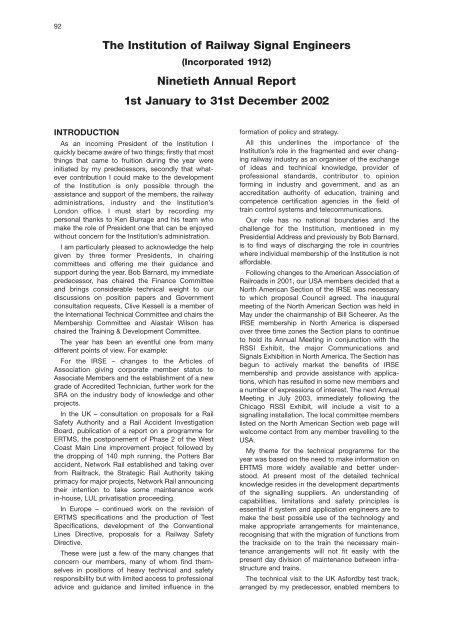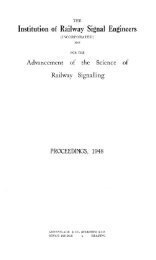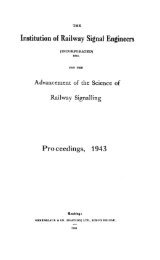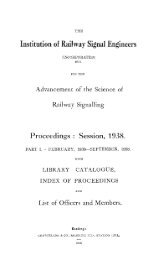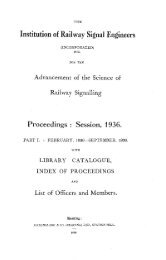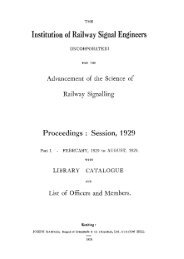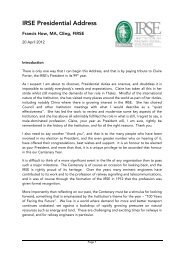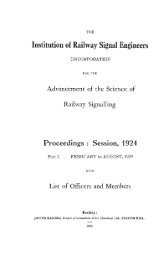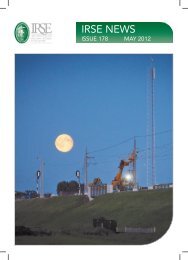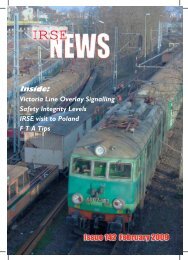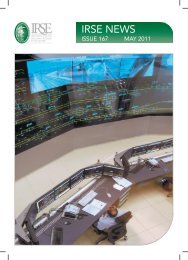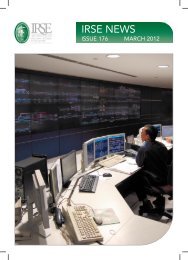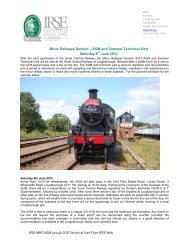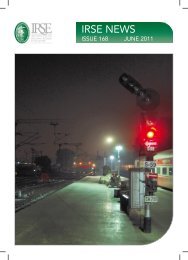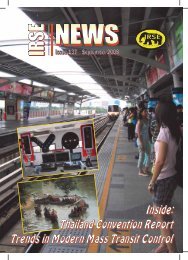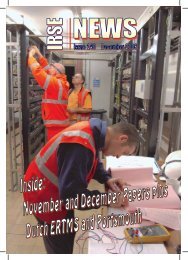Proceedings 2002/2003 - IRSE
Proceedings 2002/2003 - IRSE
Proceedings 2002/2003 - IRSE
You also want an ePaper? Increase the reach of your titles
YUMPU automatically turns print PDFs into web optimized ePapers that Google loves.
92<br />
The Institution of Railway Signal Engineers<br />
(Incorporated 1912)<br />
Ninetieth Annual Report<br />
1st January to 31st December <strong>2002</strong><br />
INTRODUCTION<br />
As an incoming President of the Institution I<br />
quickly became aware of two things; firstly that most<br />
things that came to fruition during the year were<br />
initiated by my predecessors, secondly that whatever<br />
contribution I could make to the development<br />
of the Institution is only possible through the<br />
assistance and support of the members, the railway<br />
administrations, industry and the Institution’s<br />
London office. I must start by recording my<br />
personal thanks to Ken Burrage and his team who<br />
make the role of President one that can be enjoyed<br />
without concern for the Institution’s administration.<br />
I am particularly pleased to acknowledge the help<br />
given by three former Presidents, in chairing<br />
committees and offering me their guidance and<br />
support during the year. Bob Barnard, my immediate<br />
predecessor, has chaired the Finance Committee<br />
and brings considerable technical weight to our<br />
discussions on position papers and Government<br />
consultation requests, Clive Kessell is a member of<br />
the International Technical Committee and chairs the<br />
Membership Committee and Alastair Wilson has<br />
chaired the Training & Development Committee.<br />
The year has been an eventful one from many<br />
different points of view. For example:<br />
For the <strong>IRSE</strong> – changes to the Articles of<br />
Association giving corporate member status to<br />
Associate Members and the establishment of a new<br />
grade of Accredited Technician, further work for the<br />
SRA on the industry body of knowledge and other<br />
projects.<br />
In the UK – consultation on proposals for a Rail<br />
Safety Authority and a Rail Accident Investigation<br />
Board, publication of a report on a programme for<br />
ERTMS, the postponement of Phase 2 of the West<br />
Coast Main Line improvement project followed by<br />
the dropping of 140 mph running, the Potters Bar<br />
accident, Network Rail established and taking over<br />
from Railtrack, the Strategic Rail Authority taking<br />
primacy for major projects, Network Rail announcing<br />
their intention to take some maintenance work<br />
in-house, LUL privatisation proceeding.<br />
In Europe – continued work on the revision of<br />
ERTMS specifications and the production of Test<br />
Specifications, development of the Conventional<br />
Lines Directive, proposals for a Railway Safety<br />
Directive.<br />
These were just a few of the many changes that<br />
concern our members, many of whom find themselves<br />
in positions of heavy technical and safety<br />
responsibility but with limited access to professional<br />
advice and guidance and limited influence in the<br />
formation of policy and strategy.<br />
All this underlines the importance of the<br />
Institution’s role in the fragmented and ever changing<br />
railway industry as an organiser of the exchange<br />
of ideas and technical knowledge, provider of<br />
professional standards, contributor to opinion<br />
forming in industry and government, and as an<br />
accreditation authority of education, training and<br />
competence certification agencies in the field of<br />
train control systems and telecommunications.<br />
Our role has no national boundaries and the<br />
challenge for the Institution, mentioned in my<br />
Presidential Address and previously by Bob Barnard,<br />
is to find ways of discharging the role in countries<br />
where individual membership of the Institution is not<br />
affordable.<br />
Following changes to the American Association of<br />
Railroads in 2001, our USA members decided that a<br />
North American Section of the <strong>IRSE</strong> was necessary<br />
to which proposal Council agreed. The inaugural<br />
meeting of the North American Section was held in<br />
May under the chairmanship of Bill Scheerer. As the<br />
<strong>IRSE</strong> membership in North America is dispersed<br />
over three time zones the Section plans to continue<br />
to hold its Annual Meeting in conjunction with the<br />
RSSI Exhibit, the major Communications and<br />
Signals Exhibition in North America. The Section has<br />
begun to actively market the benefits of <strong>IRSE</strong><br />
membership and provide assistance with applications,<br />
which has resulted in some new members and<br />
a number of expressions of interest. The next Annual<br />
Meeting in July <strong>2003</strong>, immediately following the<br />
Chicago RSSI Exhibit, will include a visit to a<br />
signalling installation. The local committee members<br />
listed on the North American Section web page will<br />
welcome contact from any member travelling to the<br />
USA.<br />
My theme for the technical programme for the<br />
year was based on the need to make information on<br />
ERTMS more widely available and better understood.<br />
At present most of the detailed technical<br />
knowledge resides in the development departments<br />
of the signalling suppliers. An understanding of<br />
capabilities, limitations and safety principles is<br />
essential if system and application engineers are to<br />
make the best possible use of the technology and<br />
make appropriate arrangements for maintenance,<br />
recognising that with the migration of functions from<br />
the trackside on to the train the necessary maintenance<br />
arrangements will not fit easily with the<br />
present day division of maintenance between infrastructure<br />
and trains.<br />
The technical visit to the UK Asfordby test track,<br />
arranged by my predecessor, enabled members to


